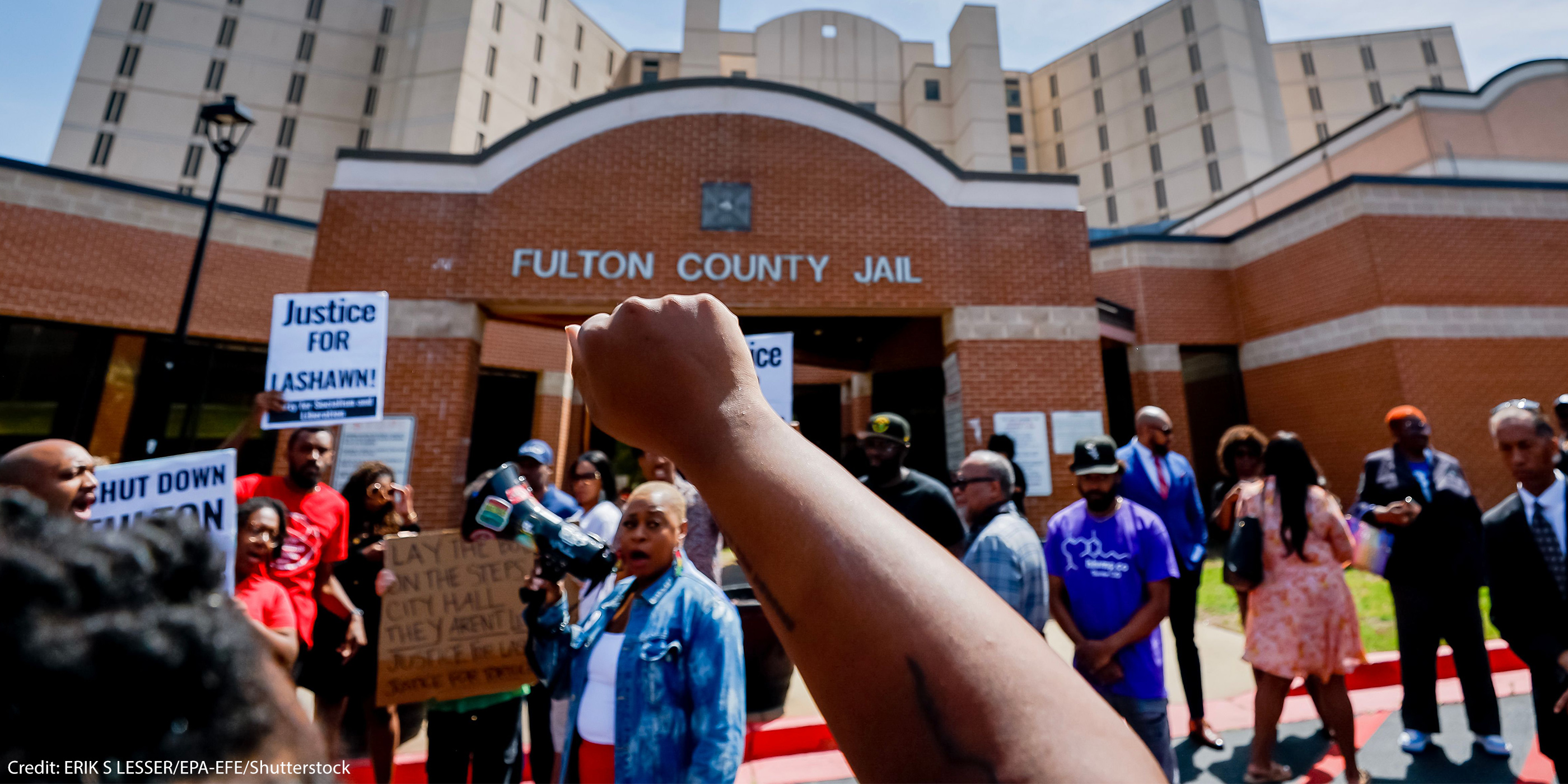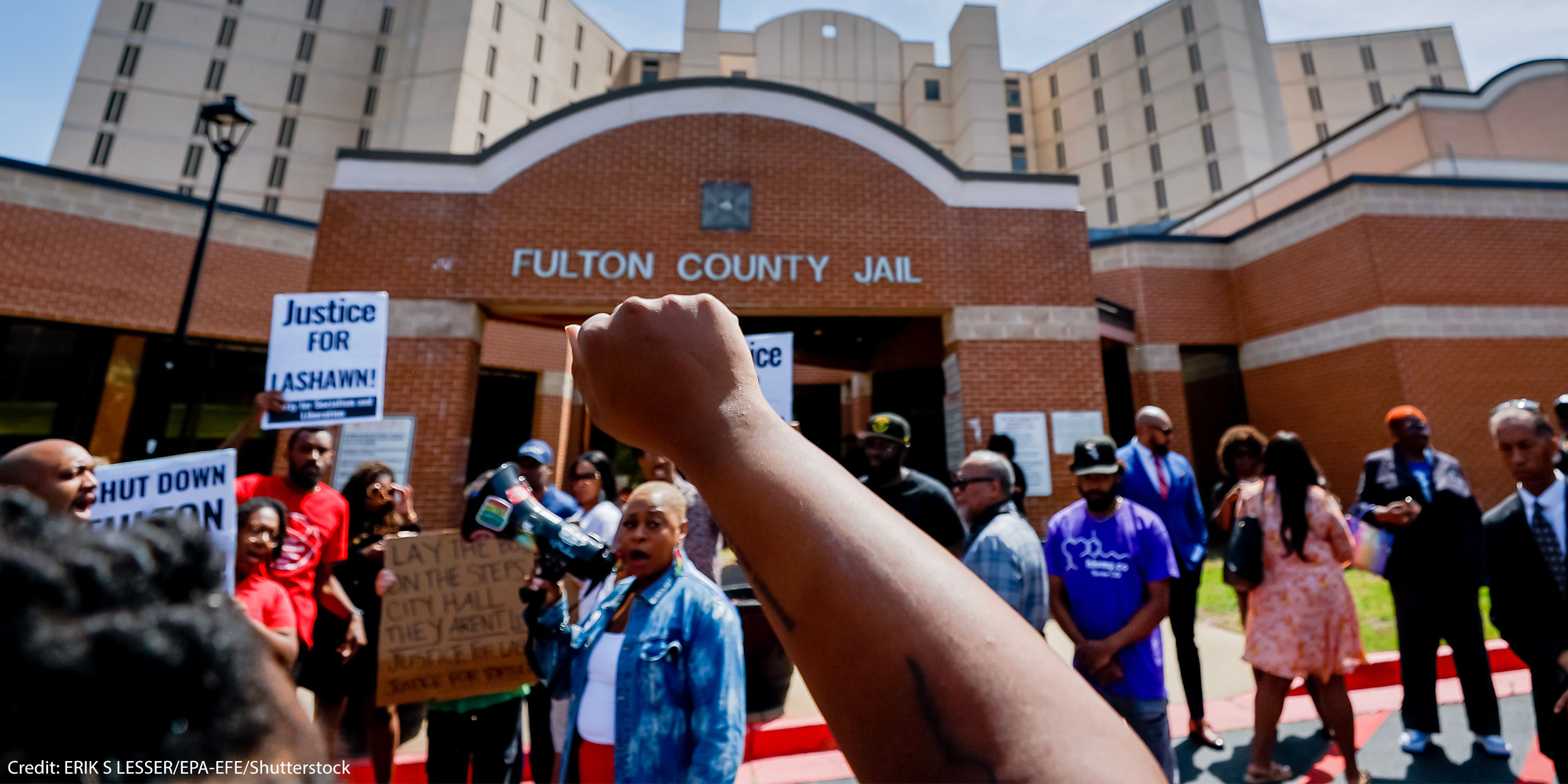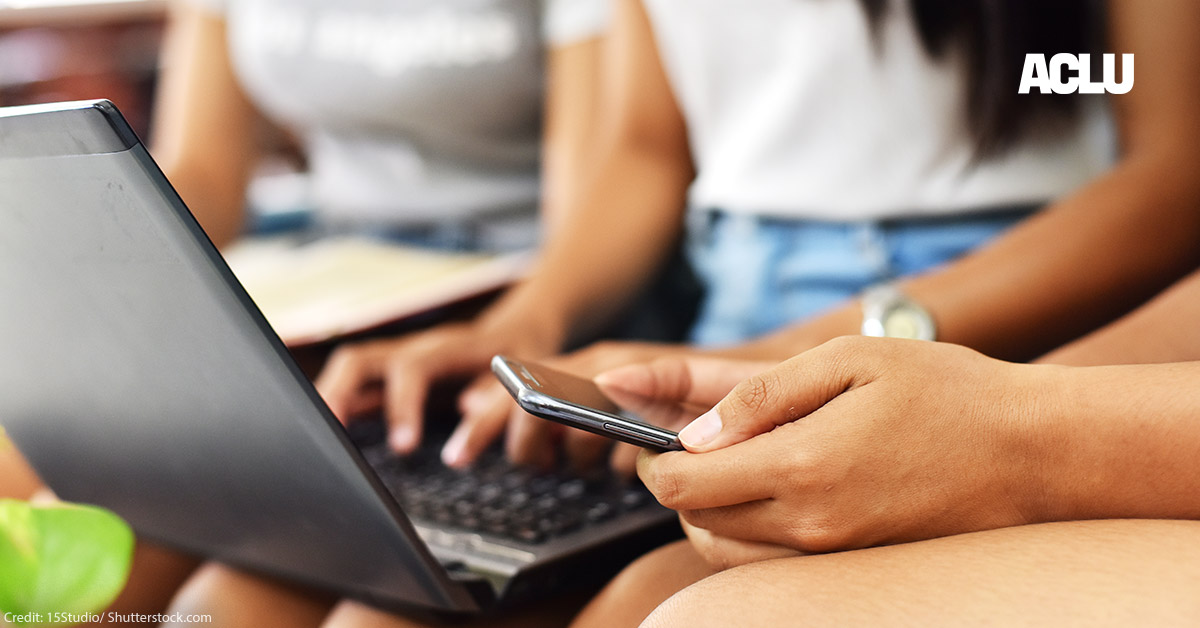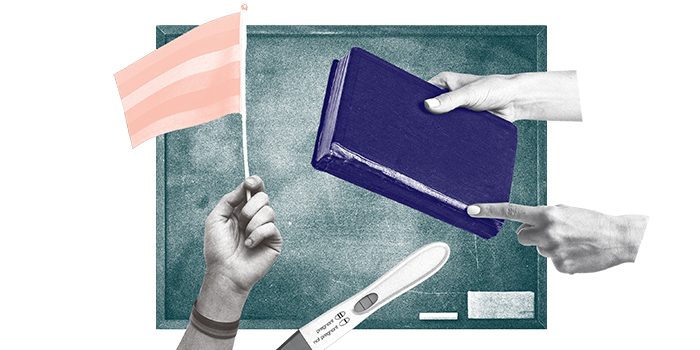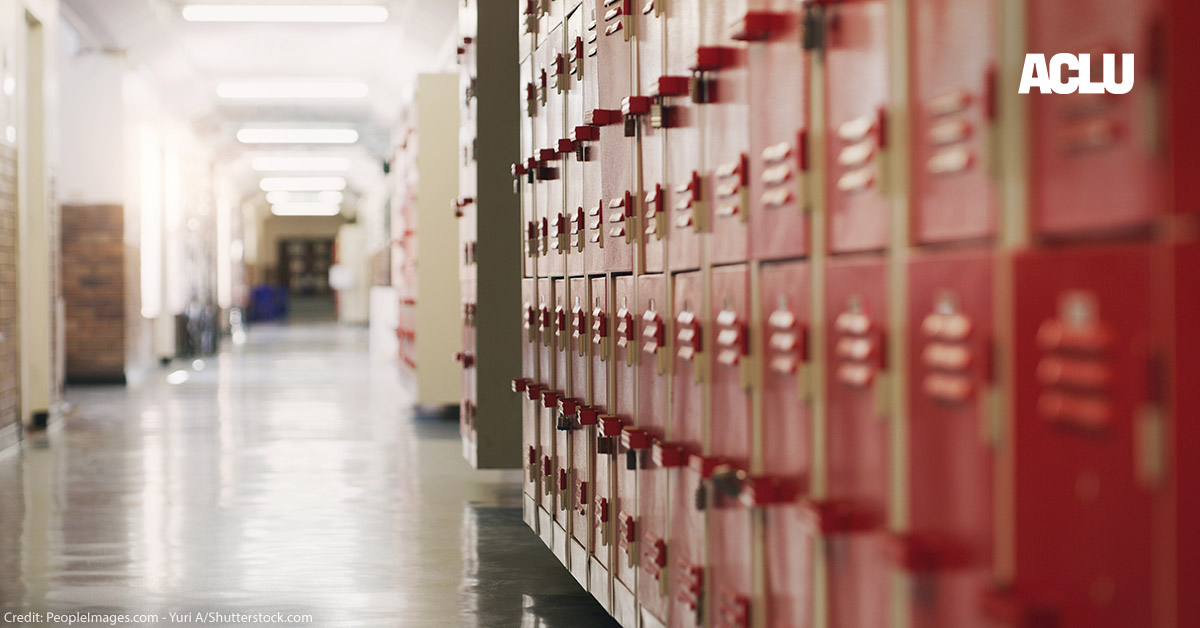Content warning: This piece includes disturbing details about the deaths of incarcerated people.
LaShawn Thompson died late last year while being detained pretrial in Atlanta’s Fulton County jail. He was incarcerated there — and died — because he could not afford $2,500 in bail for a misdemeanor charge. An autopsy confirms that his death was a homicide caused by neglect, malnourishment, and that his body was literally eaten by bugs. It took eight months for this gruesome and horrible truth to come to light.
Tragically and shamefully, Mr. Thompson is not the only person to recently die in the Fulton County jail. Just this week, 40-year-old Montay Stinson was found unresponsive in his cell. He had reportedly been in the jail for nearly a year, with bail set at $3,000. And last month, Noni Battiste-Kosoko, who was only 19 years old, was found dead in her cell In Fulton County custody just last month. Far less has been revealed about the circumstances of her death. What we do know is that Ms. Battiste-Kosoko was in custody because she had been accused (not convicted) of damaging walls and tables in a high school: for acting like a teenager.
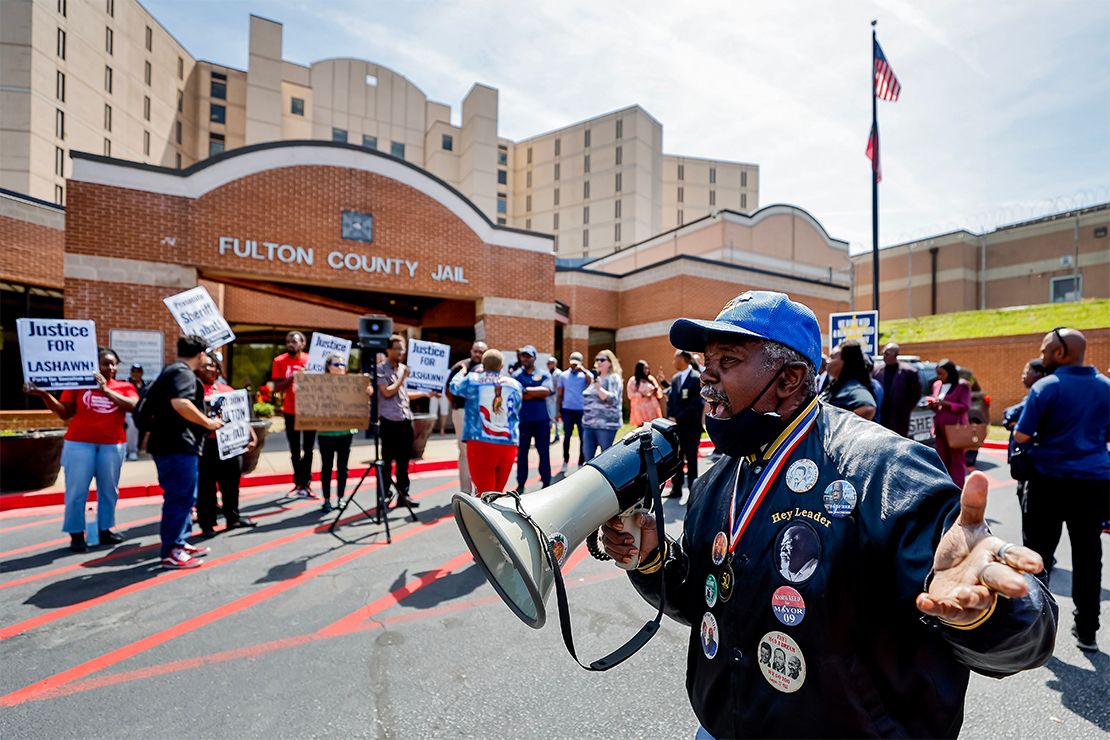
Protestors condemned the death of LaShawn Thompson as they rallied in front of the Fulton County Jail.
Credit: ERIK S LESSER/EPA-EFE/Shutterstock
Since the beginning of 2022, at least 18 people have died in Fulton County’s custody that we know of. These tragic deaths are not just unacceptable, they were preventable. As the ACLU and our partners have been pointing out for years, there are a considerable number of people incarcerated in Fulton County and across the country solely because they are too poor to post cash bail. In such cases, these people have been determined to not be a threat to the public, and they have not been convicted of a crime.
While much of the blame for unlivable jail conditions in Atlanta has rightly been placed with the local Sheriff’s office and those who oversee the facility, numerous elected officials in Fulton County are equally if not more responsible for the conditions in the jail. Following the unanimous passage of a bipartisan bail reform bill in 2018, Georgia law requires that judges consider an individual’s financial circumstances — their income, their expenses and debts, and whether they have dependents — when setting bail. A system where some people are indefinitely detained and others are allowed to go home and await trial with their families, simply because of their access to wealth, is unconstitutional. Unfortunately, individuals who cannot afford bond are routinely held in custody for months or years, despite a judge finding they are not a risk to the public. This doesn’t just contribute to jail overcrowding and deadly conditions: it is a primary cause of Fulton County’s current humanitarian crisis.
Since the beginning of 2022, at least 18 people have died in Fulton County’s custody.
Much of the public debate around criminal law reform stems from our collective desire to live in safe, stable communities. Yet far too little attention is paid to the incredible harm that occurs because of incarceration, particularly in crowded jails like Fulton County’s. Assaults, including sexual assaults, are rampant; medical care is abysmal; conditions are squalid; and death tolls are rising in jails nationwide. These cascading harms traumatize and stigmatize all who are exposed to them. That trauma follows people to their communities after they are eventually released.
In addition to worsening the racial disparities in the criminal justice system, holding individuals awaiting trial increases the chances they will commit crimes in the future, according to a Georgia-based, bipartisan commission of judges, prosecutors, and policy experts. This two-tiered system of justice is intolerable and is making Atlanta less safe. Additionally, there is a financial and human cost on communities when people are incarcerated simply because they are unable to pay their bond. Low-income Fulton County residents who are incarcerated will have to rely on their friends and families scraping together whatever funds they have to pay unnecessarily high bonds, taking that money out of the community. The cost of this unnecessary detention is part of the $14 billion that Americans spend every year to incarcerate legally innocent people.
These tragic deaths are not just unacceptable, they were preventable.
Despite bipartisan calls for reform, and full awareness of the financial and human crisis caused by overcrowding, Fulton County officials have not meaningfully acted to address the issues in the jail. In New York City, there is a growing and serious possibility that oversight of the Rikers Island jail complex will be taken over by a federal receiver. Fulton County jail is currently under investigation by the U.S. Department of Justice.
If county officials want to avoid similar federal intervention, including the millions (if not billions) of tax dollars such a receivership would cost, there are several urgent steps they can take. Law enforcement should focus on arrests only where individuals are a threat to others use their authority to issue citations for such crimes instead of needlessly jailing them. Prosecutors should decline to prosecute or pursue pretrial diversion more often, particularly in cases that involve addiction, mental illness, or poverty. Judges must provide timely and complete hearings to anyone arrested and jailed to ensure that anyone who can be safely released is not being unnecessarily incarcerated.
As our analysis of the Fulton County jail crisis showed last year, increasing the jail’s footprint and adding beds will not solve issues of community safety. Subjecting our community members to the dangers of incarceration is not making us safer, and no number of additional beds will fix the problem. Fulton County did ultimately obtain additional jail beds at the Atlanta City Detention Center, where Noni Battiste-Kosoko died. The complacency and failure to act on the policy failures that cause overcrowding will result in more deaths, bankrupt our communities financially and morally, and continue to make us less safe in Fulton County. We demand our elected officials do better, and the time to act is right now.
Date
Thursday, August 3, 2023 - 4:45pmFeatured image
